Crisis of the Strauss Divided
Crisis of the Strauss Divided
Essays on Leo Strauss and Straussianism, East and West
Harry V. Jaffa
With Thomas L. Pangle, John A.
Wettergreen, Robert P. Kraynak,
Michael P. Zuckert, and Leo Strauss
ROWMAN & LITTLEFIELD PUBLISHERS, INC.
Lanham Boulder New York Toronto Plymouth, UK
Published by Rowman & Littlefield Publishers, Inc.
A wholly owned subsidiary of The Rowman & Littlefield Publishing Group, Inc.
4501 Forbes Boulevard, Suite 200, Lanham, Maryland 20706
www.rowman.com
10 Thornbury Road, Plymouth PL6 7PP, United Kingdom
Copyright 2012 by Rowman & Littlefield Publishers, Inc.
All rights reserved. No part of this book may be reproduced in any form or by any electronic or mechanical means, including information storage and retrieval systems, without written permission from the publisher, except by a reviewer who may quote passages in a review.
British Library Cataloguing in Publication Information Available
Library of Congress Cataloging-in-Publication Data
Jaffa, Harry V.
Crisis of the Strauss divided : essays on Leo Strauss and Straussianiasm, East and West / Harry V. Jaffa.
p. cm.
ISBN 978-1-4422-1711-9 (cloth : alk. paper) -- ISBN 978-1-4422-1713-3 (electronic)
1. Strauss, Leo--Political and social views. I. Title.
JC251.S8J34 2012
320.01'1--dc23
2012013616
 The paper used in this publication meets the minimum requirements of American National Standard for Information Sciences Permanence of Paper for Printed Library Materials, ANSI/NISO Z39.48-1992.
The paper used in this publication meets the minimum requirements of American National Standard for Information Sciences Permanence of Paper for Printed Library Materials, ANSI/NISO Z39.48-1992.
Printed in the United States of America
For Marjorie
The girl in the canoe
I took one look at you,
Thats all I had to do,
And my heart stood still.
Forever
Foreword
We have no higher duty, and no more pressing duty, than to remind ourselves and our students, of political greatness, human greatness, of the peaks of human excellence. We are supposed to train ourselves and others in seeing things as they are, and this means above all in seeing their greatness and their misery, their excellence and their vileness, their nobility and their triumphs, and therefore never to mistake mediocrity, however brilliant, for true greatness.
Leo Strauss, eulogy of Winston Churchill, January 25, 1965
Harry Jaffa has written and said many beautiful things in a long lifetime of scholarship and teaching. Among the most beautiful have been his expressions of reverence and gratitude for his teacher, Leo Strauss. He credits Strauss with giving him a gift dearer than life itself. Strauss taught him what to do with his lifehe brought Jaffa to reason. When the young Jaffas mind, unbeknownst to itself, was in the grips of the historicism and relativism that remain the conventional wisdom of our time, Strausss teaching struck off [his] shackles, turned him from his illusions, and dragged him up from the cave of nihilism to the light of natural right.
Jaffas reverence for his teacher is made possible by the greater reverence his teacher taught him to have for truth. In the service of this greater reverence, Jaffa has spent a fair portion of his life arguing with those intellectually closest to himnot least among them, himself. A friend recently gave me a copy of Crisis of the House Divided, on the cover page of which Jaffa had written in pencil half a century ago, For Willmoore Kendall who knows that amicus quidem Socrates amicior veritas. Jaffa used to argue to the knife with Kendall about the character of the American founding and the significance of Abraham Lincoln, late into the night on long distance telephone from Claremont to Dallas. When he later disagreed with himself on these questions, as he did most notably in his two great worksCrisis of the House Divided and A New Birth of Freedomhe might be forgiven for thinking the pursuit of truth had brought him up against an even more formidable opponent. It is that wide ranging pursuit that gave rise to the disputations collected in this volume.
One of the common criticisms of Jaffa is that he takes politics and morality more seriously than philosophic minds would do; that he shows a regard for America in particular that no philosophic mind would show for any earthly regime; that he shows more regard for America than Strauss ever did or more than Strausss thought could ever justify. If I understand Jaffas response to such criticisms, it is, in part, that these critics fail to understand political philosophy because they have lost sight of the experience that is antecedent to books. They do not pay sufficient attention to the natural prephilosophic world of political life and the real questions raised there and always abiding there, which make political philosophy necessary and possible. Because of this, they fail to understand the relationship between political philosophy and statesmanshipbetween natural right and political right. He argues that admiration of the good and detestation of evil are grounded in nature and are inherently disinterested, that the moral and political phenomena are the theoretical, no less than the practical, ground of philosophic wisdom. Jaffa admonishes these critics, then, in the name of politics and morality, but as he would say, mainly and ultimately in the interest of philosophy itself. It is his duty, he thinks, to try to teach philosophersor those who think of themselves as serving the cause of philosophyto act responsibly. In doing this, he understands himself to be defending political philosophy, Western civilization, political freedom, America, and the legacy of Leo Strauss.
Strauss was concerned with the crisis of our time, the crisis of the West, as he put it in The City and Man. Jaffa made the judgment that the decisive crisis of the West was the crisis of America, the Crisis of the House Divided. At the heart of each crisis was the repudiation of natural right. Strauss spoke of the loss of the sense of purpose, the loss of confidence in the West. Jaffa wondered about the loss of confidence in America, whose essential principle is that Almighty God hath created the mind free. His life and the life of his teacher taken together are great monuments to the freedom of the mind. The essays collected here compellingly express that freedom and the purpose of that freedomwhich is to be determined by the truth. Harry Jaffas students have for many years been fondly calling him The Old Man. He has by now richly earned the moniker. Let The Old Man speak for himself, as he does in the stirring, thought-provoking exchanges gathered in these pages.
Christopher Flannery
Preface
What follows is the introductory chapter to a collection of essays entitled Crisis of the Strauss Divided: Essays on Leo Strauss and Straussianism, East and West.
The essays do not form chapters in a unified treatise or book. They span almost forty years, and are presented chronologically, each representing an insight or point of view that seemed important at the time. Whatever Leo Strauss for the Ages the reader may distill from these pages will be his or her responsibility.
Chapter 1
Straussian Geography
A Memoir and Commentary
I
Professors Catherine and Michael Zuckert, in a remarkable example of connubial collaboration, have coauthored a remarkable book, entitled The Truth About Leo Strauss: Political Philosophy and American Democracy. This title would have been misleading, if they had said the whole truth about Leo Strauss which no one is likely to possess in our lifetime, if ever, but they have undoubtedly made a major contribution to the pursuit of that truth. The sudden and explosive notoriety of this little known political science professor, more than thirty years after his death, is an extraordinary phenomenon. It is perhaps even more striking to me than to the Zuckerts. They knew him as graduate students at the University of Chicago, where he enjoyed the eminence of a major chair at a major university. At the Graduate Faculty of Political and Social Science of the New School for Social Research (to give it its full name) he was a little known figure in a little known institution. The Graduate Faculty had been added in the thirties to the original New School, which had been founded in the twenties by some of the leading lights of the Progressive era as a progressive enterprise in adult education. The Graduate Faculty had been originally called the University in Exile, to provide a haven for distinguished scholars who were refugees from Hitlers Europe. Prestigious or not, that faculty in the forties, may have been, for a decade or more, the greatest faculty of its kind ever assembled under one roof, courtesy of Adolf Hitler. But it received little or no notice in the world of the elite universities. In the finest act of his glorious but ill-starred career, Robert Hutchins snatched Strauss out of obscurity and brought him to Chicago. In time, Strauss became the Robert M. Hutchins Distinguished Service Professor. I doubt that I myself would have had an academic career had Strauss remained where I had found him. He wrote to me in the summer of 1948, when I was visiting at my wifes family farm in Missouri, that he had been offered the position at Chicago. He wrote that he would have made it a condition of his acceptance that they find a position for me, who then had none. But he was sure that it would be a simple matter once he was there. And so, when he made his courtesy visit to Hutchins, and Hutchins made his courtesy request, many doors were opened to me. David Riesman, who was then at the height of his fame as the author of
Next page
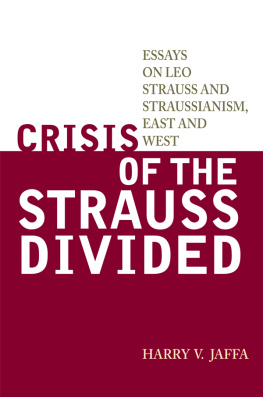
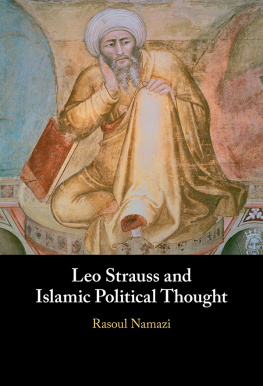
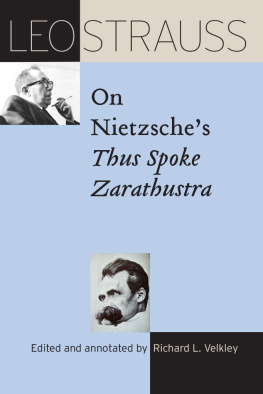
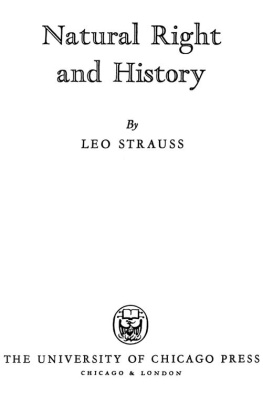




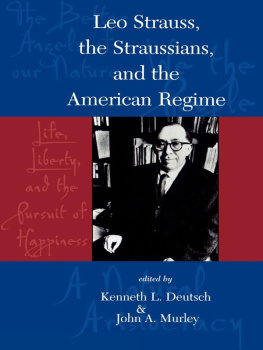
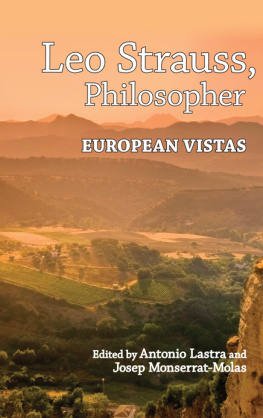
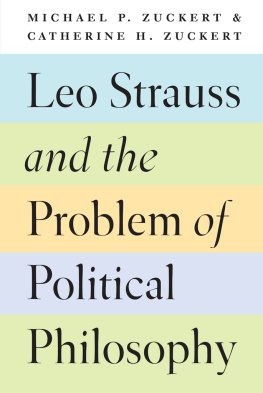
 The paper used in this publication meets the minimum requirements of American National Standard for Information Sciences Permanence of Paper for Printed Library Materials, ANSI/NISO Z39.48-1992.
The paper used in this publication meets the minimum requirements of American National Standard for Information Sciences Permanence of Paper for Printed Library Materials, ANSI/NISO Z39.48-1992.